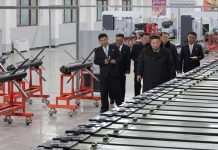KHARTOUM: As foreign diplomats evacuate Sudan in the midst of fierce fighting, millions of civilians are being left behind to survive as best as they can, leaving many frustrated at what they see as an armed conflict between previously Western-backed generals.
Sudanese analysts and activists who spoke to media blamed Western officials for emboldening and legitimising the paramilitary Rapid Support Forces, led by Mohamed Hamdan “Hemedti” Dagalo, and the army under Abdel Fattah al-Burhan, the two men embroiled in a deadly armed conflict since April 15.
“I think there was a lot of hand-holding and appeasement of these generals because the US believed that they could create reformers out of them,” said Sudanese expert Kholood Khair, the founding director of Confluence Advisory.
According to the International Crisis Group, the catalyst for the armed struggle terrorising Sudan was a Western-conceived Framework Agreement that was signed on December 5, ostensibly to restore a civilian administration after the RSF and the army upended the country’s frail transition to democracy with a coup in October 2021.
The Framework Agreement initiated a series of political negotiations between the army, the RSF and a coalition of political parties known as the Forces for Freedom and Change – Central Command (FFC-CC).
One of the most sensitive issues to be worked out was security sector reform and a dispute over the integration of the RSF into the army – and the narrow timeframe Western countries gave them to resolve it – escalated tensions between the rivals.
The army wanted to absorb the RSF in two years, while the RSF wanted to remain an autonomous force with its own command for another decade. Both feared losing power and relevance to the other in a new political environment.
Still, Western officials pressured both forces to sign a deal.
The Western position was that security elites needed to be part of a democratic transition and that they would be incentivised to support a transition for Sudan to access millions of dollars worth of development aid and billions in debt relief.
The assumption was that the RSF and the military would prioritise the stability of Sudan, not just their own power.
On a personal level, according to one Western diplomat, many of those overseeing the negotiations wanted a success that they would be able to point to.
“Many diplomats are very result oriented and they want something tangible. Of course, a [political] deal is tangible,” the diplomat, not authorised to speak to the press, told Al Jazeera a couple weeks before the Framework Agreement was announced. “Maybe a deal would last for six months – and then when those diplomats leave – they can write on their CVs that they were instrumental in getting a deal done in Sudan.”
“I think if the international community – particularly the Americans – does not take stock about how their contributions have led us to where we are, then there is a serious problem,” Khair said.
—Agencies




